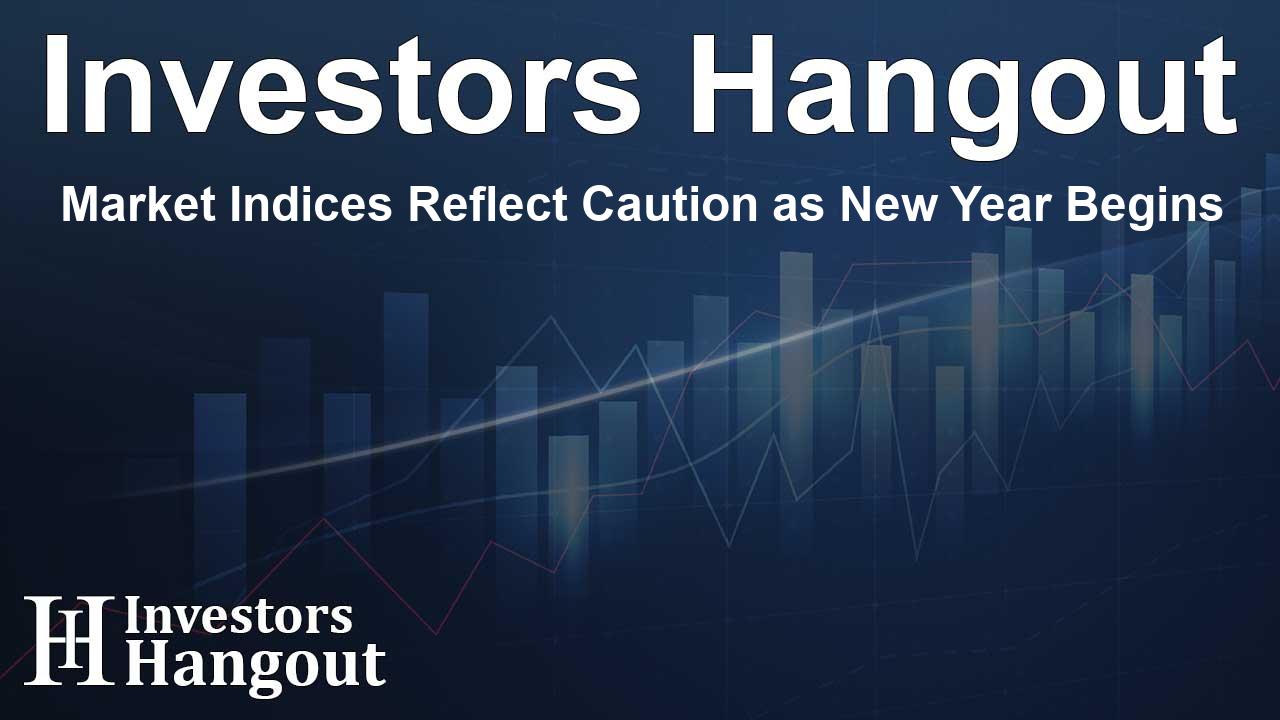Cautious Opening for U.S. Stock Index Futures
As the new year dawns, U.S. stock index futures are experiencing a cautious opening. Recent fluctuations in economic policies, particularly surrounding artificial intelligence advancements and interest rates, have contributed to this caution. The last year saw remarkable gains across equity markets, predominantly fueled by excitement over AI developments.
However, optimism began to wane towards the conclusion of the previous year. The anticipated “Santa Rally,” which typically boosts markets in late December, failed to meet expectations, leaving investors uncertain. The Federal Reserve’s reticence to cut interest rates quickly added to this unease, as did the unpredictable policy direction following the election of the new President.
Market Indices Performance
On the latest trading session, S&P 500 Futures marked a slight decline of 0.1%, settling at 5,927.25 points. Similarly, Nasdaq 100 Futures fell to 21,213.50 points, while Dow Jones Futures decreased by 0.2%, reaching 42,809.0 points. This downward trend reflects a broader hesitance within the market, particularly with trading volumes demonstrating reduced activity amidst year-end holidays.
Broader Market Sentiment and External Factors
The market's cautious sentiment has been shaken by several external factors. A tragic vehicle attack in New Orleans that resulted in significant loss of life has heightened worries among investors. Additionally, the unexpected explosion of a Tesla Cybertruck near the Trump Hotel in Las Vegas has added a layer of uncertainty to the market landscape.
Wall Street's Recent Performance
Despite a largely productive year, Wall Street's performance in the final days of the previous year has raised eyebrows. Although major indexes demonstrated strong yearly gains—28.6% for Nasdaq, 23.3% for S&P 500, and 12.9% for Dow—November and December marked periods of stagnation. The S&P 500 closed down 0.4% on the last trading session of the year, while the Nasdaq saw a more pronounced decline of 0.9%.
This plateau raises questions about the sustainability of these gains as investors grapple with new realities in the market and potential shifts in economic policy triggered by the newly elected President. As attention turns towards 2025, many are eager to assess how Trump's forthcoming economic policies will influence market performance.
Anticipating Policy Changes in 2025
As President Trump prepares to assume office, his potential economic strategies and international policies are expected to become central topics of discussion. Trump has indicated plans for expansionary fiscal policies combined with significant trade tariffs against key partners such as China and Mexico, which may lead to inflationary pressures.
The Federal Reserve's recent communications point toward a more gradual approach to interest rate cuts, reflecting their assessment of persistent inflation and a resilient labor market. Such sentiments have contributed to a recent sell-off in stocks, highlighting the interconnectedness of fiscal policy and market stability.
Conclusion
The start of 2025 exemplifies a period of uncertainty for U.S. stock markets, where cautious optimism faces challenges from both policy shifts and external events. Investors are watching closely as signs of stability emerge amid a landscape that could define market trajectories for the year ahead.
Frequently Asked Questions
What factors are causing concern in the stock market as 2025 begins?
Concerns stem from uncertainties surrounding interest rate adjustments by the Federal Reserve and potential economic policies under President Trump, as well as recent tragic events that impacted market sentiment.
How are U.S. stock index futures performing?
U.S. stock index futures are experiencing a slight decline, with S&P 500 Futures down 0.1%, reflecting the cautious atmosphere among investors.
What was the performance of major stock indexes in 2024?
The Nasdaq rose by 28.6%, the S&P 500 increased by 23.3%, and the Dow Jones added 12.9%, marking a successful year despite recent downturns.
What are the anticipated economic policies of President Trump?
Trump's policies are expected to focus on expansionary fiscal measures and significant trade tariffs, which are likely to influence inflation dynamics in the U.S. economy.
How is the Federal Reserve responding to current economic indicators?
The Fed is signaling a slower pace of interest rate cuts due to ongoing inflation concerns and a strong job market, which may affect market conditions moving forward.
About Investors Hangout
Investors Hangout is a leading online stock forum for financial discussion and learning, offering a wide range of free tools and resources. It draws in traders of all levels, who exchange market knowledge, investigate trading tactics, and keep an eye on industry developments in real time. Featuring financial articles, stock message boards, quotes, charts, company profiles, and live news updates. Through cooperative learning and a wealth of informational resources, it helps users from novices creating their first portfolios to experts honing their techniques. Join Investors Hangout today: https://investorshangout.com/
Disclaimer: The content of this article is solely for general informational purposes only; it does not represent legal, financial, or investment advice. Investors Hangout does not offer financial advice; the author is not a licensed financial advisor. Consult a qualified advisor before making any financial or investment decisions based on this article. The author's interpretation of publicly available data shapes the opinions presented here; as a result, they should not be taken as advice to purchase, sell, or hold any securities mentioned or any other investments. The author does not guarantee the accuracy, completeness, or timeliness of any material, providing it "as is." Information and market conditions may change; past performance is not indicative of future outcomes. If any of the material offered here is inaccurate, please contact us for corrections.
